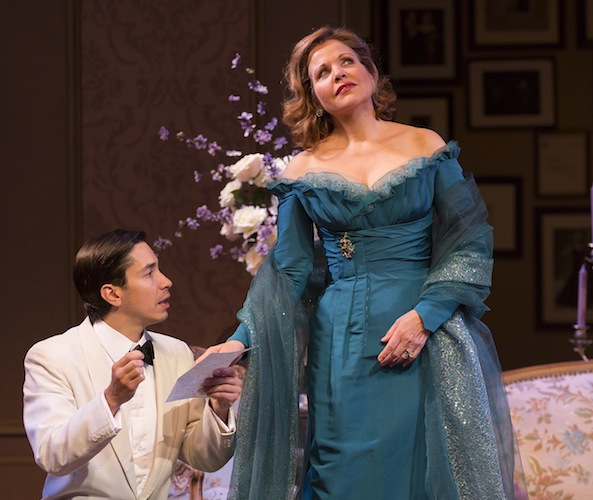Theater Review: “Living on Love” or Froth?
Incomparable opera diva Renée Fleming makes her debut as a stage actress — playing an impossible opera diva — in playwright Joe DiPietro’s sliver of a comedy Living on Love.
Living on Love, by Joe DiPietro. Directed by Kathleen Marshall. Staged by the Williamstown Theatre Festival, Main Stage, through July 26.

Renée Fleming and Justin Long in “Living on Love” at the Williamstown Theatre Festival. Photo: T. Charles Erickson.
By Iris Fanger
No need to explain the rapture of the audience this week at the Williamstown Theatre Festival, where incomparable opera diva Renée Fleming is making her debut as a stage actress, playing an impossible opera diva named Raquel De Angelis in playwright Joe DiPietro’s sliver of a comedy Living on Love. (The play has been adapted from a forgotten, older work by Garson Kanin.)
Not to disappoint her fans, Ms. Fleming comes wrapped in an extravagant series of 1950s couture costumes (designed by Michael Krass), and sings — in snatches — to punch up a character that embodies every cliché about celebrities you can imagine. She makes her first entrance slinging a fur coat and a tiny dog named Puccini on one arm, and goes on to milk her part for every nuance she can, aided by plenty of agile charm (honed by 54 leading roles from her operatic past) and an unexpected sense of humor.
Ms. Fleming is matched in gusto by musical theater star Douglas Sills, who plays Vito De Angelis, her character’s husband of 30 years. Addressed in the play as “Maestro,” Sills does not so much chew the scenery as devour it in non-stop gulps. Employing a loud, faked Italian accent, and a huge mane of silver hair, through which he regularly runs his fingers (at one point soaked in maple syrup — don’t ask), the Maestro is on the perpetual make, though not for his wife.
The plot turns on the writing of the pair’s dual autobiographies, assigned to two mouse-like ghost writers. Justin Long plays Robert Samson, turns to jelly at the sight of his subject, Raquel; Anna Chlumsky as Iris Peabody, a junior assistant editor who has left Queens to arrive at what for her is heaven, the Park Avenue penthouse where she’s to pen Vito’s tome. (Note: the setting designed by Derek McLane is indeed a destination worth leaving home for.) Long (Galaxy Quest; Funny People and Seminar on Broadway) and Chlumsky (2013 Emmy nomination for TV’s Veep) are affable clowns who turn feisty when they discover a mutual attraction for each other by the final curtain.
The cast is completed by a two-hander household staff, Bruce and Eric, portrayed by Blake Hammond and Scott Robertson. The butlers also make the prop changes while singing operatic arias, once tossing in a riff on “Makin’ Whoopee.” Their unison shtick is straight from the vaudeville stage by way of the silent film comics, but it builds to a memorable rendition of the famed duet “Au Fond Du Temple Saint” from Bizet’s opera, The Pearl Fishers, which is all the funnier because it is sung with emotion.
Despite the spot-on casting of the ensemble, and the sense of watching a mirror image of Ms. Fleming possibly playing herself (which she denies in interviews), the hero of the endeavor is director Kathleen Marshall, who has staged this minor piece of froth at a dead-run and lathered it with sight gags, well-timed blocking, and comic action whipped up to a frenzy. If not for Marshall’s interventions, and the arias and songs inserted by music coordinator Rob Fisher, the evening would be little more than a celebrity sighting. Ms. Fleming is delightful when she puts on the diva-pose, but she is not nearly as effective when called on to convey heartfelt emotions. She is hampered by a less than expressive speaking voice.
The ending, when we are supposed to believe that these two aging stars have torn off their masks and revealed their insecurities about aging and fears of being edged out of the spotlight, comes off as lifeless. Still, the windup is redeemed by a highly choreographed, full-throttled curtain call. We see the characters revert to their earlier egomaniacal selves, out to steal the spotlight from each other, in a competition set to tempos from The Barber of Seville.
Iris Fanger is a theater and dance critic based in Boston. She has written reviews and feature articles for the Boston Herald, Boston Phoenix, Christian Science Monitor, New York Times, and Patriot Ledger as well as for Dance Magazine and Dancing Times (London).
Former director of the Harvard Summer Dance Center, 1977-1995, she has taught at Lesley Graduate School and Tufts University, as well as Harvard and M.I.T. She received the 2005 Dance Champion Award from the Boston Dance Alliance and in 2008, the Outstanding Career Achievement Award from the Graduate School of Arts and Sciences at Tufts. She lectures widely on dance and theater history.
Tagged: Douglas Sills, Joe DiPietro, Living on Love, Renée Fleming
